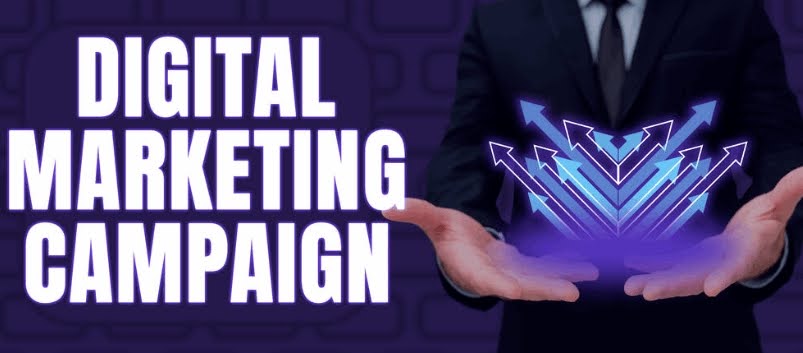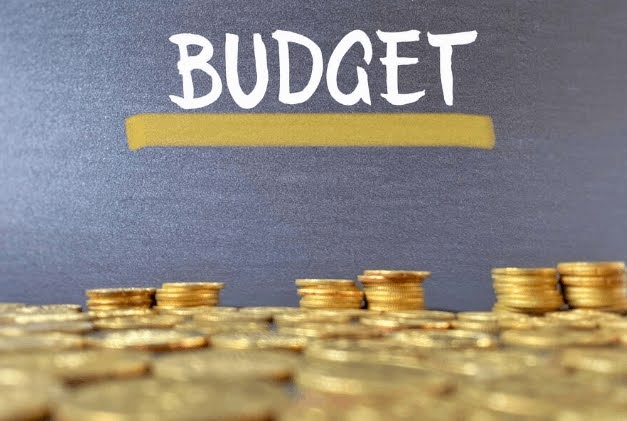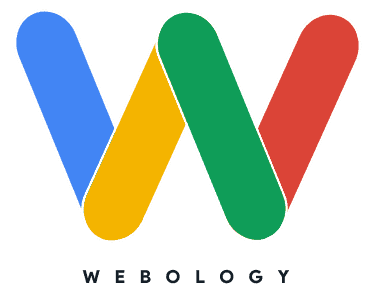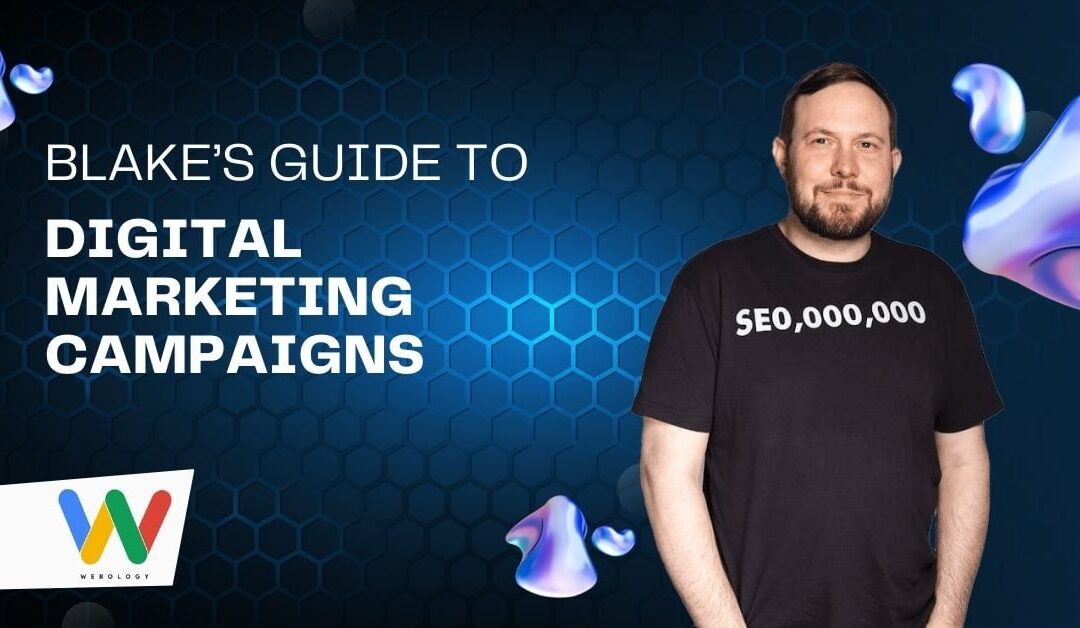In this wild digital age where AI’s disrupting everything, having a solid online presence as a business owner isn’t an option – it’s necessary.
It’s essential to develop a digital marketing campaign that can help you convert prospects into customers by leveraging the latest and greatest tools of the marketing trade.
Creating a campaign that generates your desired outcome can seem a bit complex if you’re not in the day-to-day like we are here at Webology.
You’ve got it though, and we’re here to help! You just need careful planning at every step to make it a success.
In this guide, we’ll tell you how to create a winning digital marketing campaign every…single…time. 🚀
Table of Contents
Let’s dive in.
What’s a Digital Marketing Campaign
A digital marketing campaign involves a strategic approach where you promote a company’s products or services to a specific audience.
The goal can be anything from getting more traffic to a website to an increase in brand awareness.
A well-planned digital marketing campaign helps you:
- Identify your audience
- Specify your goals
- Decide the strategies that will work best (SEO, email marketing, PPC, etc.)
Now that you know what a digital marketing campaign is, let’s move on to the practical stuff.
How to Create a Digital Marketing Campaign

Here’s a step-by-step process for creating an impactful digital marketing campaign for any business.
Set Your Goals
Start by defining a definite goal. This can be a tricky first step as there are too many options.
Setting too many goals will make it tough for you to achieve any of them.
Your goal should be S.M.A.R.T (Specific, Measurable, Achievable, Relevant, and Time-Bound).
Think about what you want to achieve with your campaign.
Is it more leads, customers, email signups, website traffic, or something else?
Here’s an example:
Increase website traffic from search engines by 3000 visitors in the next 3 months.
The goal should have a clear plan of action.
For instance:
- Evaluate and update your existing content
- Find new low-competition keywords
- Write new posts
- Perform link-building outreach X times a week
In some cases, the goal can be about your reputation. We recently onboarded a client that needed help with their brand image regarding how they appeared in the search results. That strategy required us to do SEO for 10 sites instead of one, because we needed to control the narrative for positions 1-10 in Google. So as you can see, your goals will usually help define the total scope of work.
Identify Your Target Audience
The success of your digital marketing campaign hinges on targeting the right audience.
If you don’t know who they are, spend some time creating a buyer persona.
Your buyer persona is simply a description of your ideal customer that you’d like to reach through your marketing campaign. A well-defined persona can help identify:
- What they do
- How much they make
- What are their hobbies
- What’s their age
- And where they like to shop
Perform Keyword Research
Whatever digital marketing campaign you’re working on, keyword research can help you stay on the right track.
Spend some time brainstorming relevant topics and put them into keyword research tools like Google Keyword Planner.
For SEO and PPC campaigns, look at a keyword’s monthly search volume and competition before working on it.
Analyze Your Competition
Competitor research allows you to find what’s working in the market.
Identify your top 3 competitors and analyze their strengths and weaknesses.
- What content strategies are they using?
- What’s their pricing like?
- What type of ads are they running?
- And more
Your goal should be to find what’s working for them and focus your efforts on those strategies.
Choose Your Marketing Platforms
The next step is to find the right digital platforms/strategies for your business.
These include SEO, email marketing, social media marketing, PPC ads, and more.
You want to focus on one or two marketing channels initially.
The strategy you choose depends on the goal you set in the beginning.
For instance, if you want more web traffic, SEO and PPC ads would be suitable, but each has a different timeline on when you can expect results. You’ll want to make sure you align all three. The goals, channel, and timelines should all make sense from a business standpoint before you begin.
You May Also Like: 12 Signs You Should Fire Your Marketing Agency

Set Your Campaign Budget
Knowing how much a digital marketing campaign is going to cost helps you create the right action plan.
Your campaign’s goal determines its budget since it decides the marketing platform/strategy.
For instance, if your goal is to build brand awareness, you may want to run a Facebook ads campaign.
A portion of your budget can also go into A/B testing and campaign optimization.
Create a Content Strategy

Content or copy is the heart and soul of a great digital marketing campaigns.
However, depending on the campaign, the type of content will vary.
Popular content types include:
- Marketing emails
- Blog posts
- Ebooks
- Online courses
- Social media posts
- Videos (Short and long)
For instance, if you want to grow your website’s search engine traffic, you’ll want to write more blog posts.
Note that tracking and optimizing remains crucial even in content marketing.
You want to have a flexible approach and adjust your content based on performance.
Start Your Campaign
Now that you have the basics covered, it’s time to hit the start button.
However, don’t jump into a paid advertising campaign by spending everything upfront
Start with a small budget and analyze your ad’s performance with a critical eye.
Track your performance and incrementally increase your budget as results improve.
This allows the algorithms to learn your campaign and optimize ad delivery.
Plus, you’ll avoid wasting your ad budget in case there’s room for improvement.
Now, it can be more challenging to test organic content. But, you can analyze the performance based on how the audience reacts.
You can also use different tools to track important metrics such as:
- Email open and click-through rates
- Landing page visits and engagement
Monitor And Optimize Performance
Every digital marketing platform has an analytics dashboard. For instance, Facebook gives you a real-time overview of important metrics in your dashboard.
You don’t need to track every metric though. Just the ones that help you achieve your marketing goals.
Once you know what to track, and have enough data, you can figure out what’s working and move forward confidently.
For instance, if the goal is to generate more leads through a landing page, track your conversion rate.
Conclusion
Creating an effective digital marketing campaign starts with choosing smart goals. The next step is to dig deep into your audience and competition.
Keyword research helps you create PPC and SEO campaigns on popular topics, improving your chances of success.
Working on the right digital channels is also crucial to achieving success.
For instance, if your audience is on Facebook, focusing on SEO won’t help your ROI (Return on investment).
In addition, invest your marketing budget wisely. If you’re running an ad campaign, start small, track your KPIs, and increase your budget accordingly.
Lastly, you want to keep testing different aspects of your digital marketing campaign to identify potential loopholes and growth opportunities.
Feeling overwhelmed? You don’t have to do it yourself. Webology can craft a winning digital marketing campaign for you.











